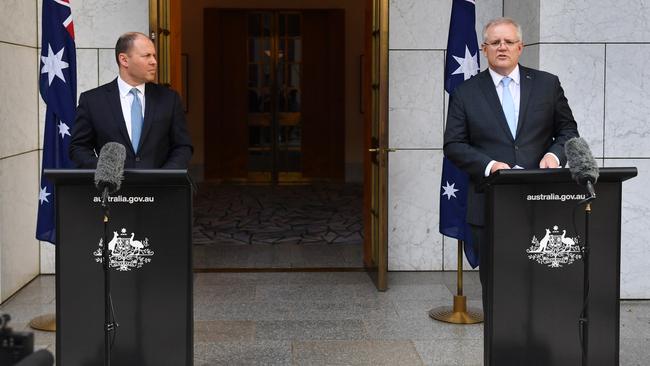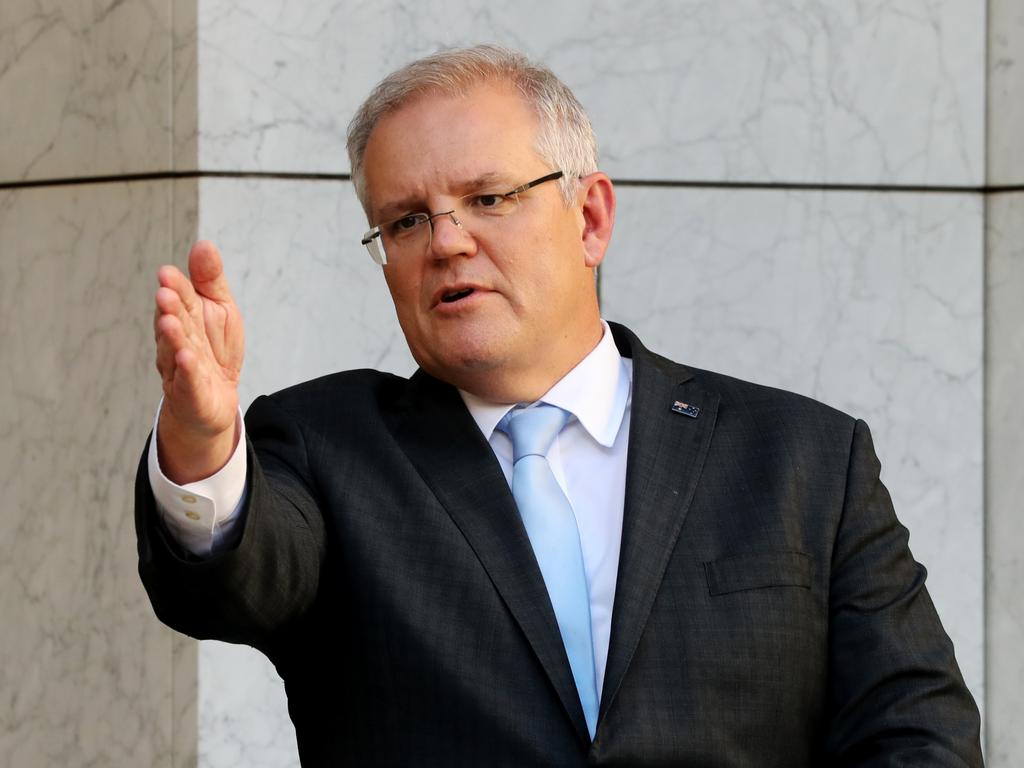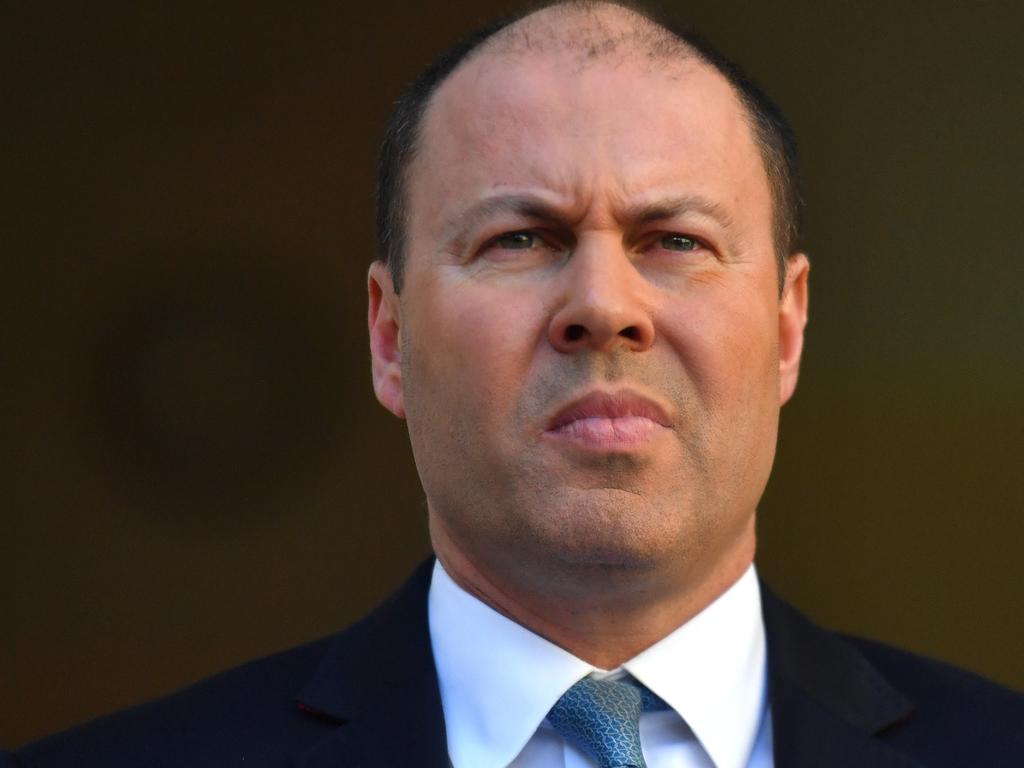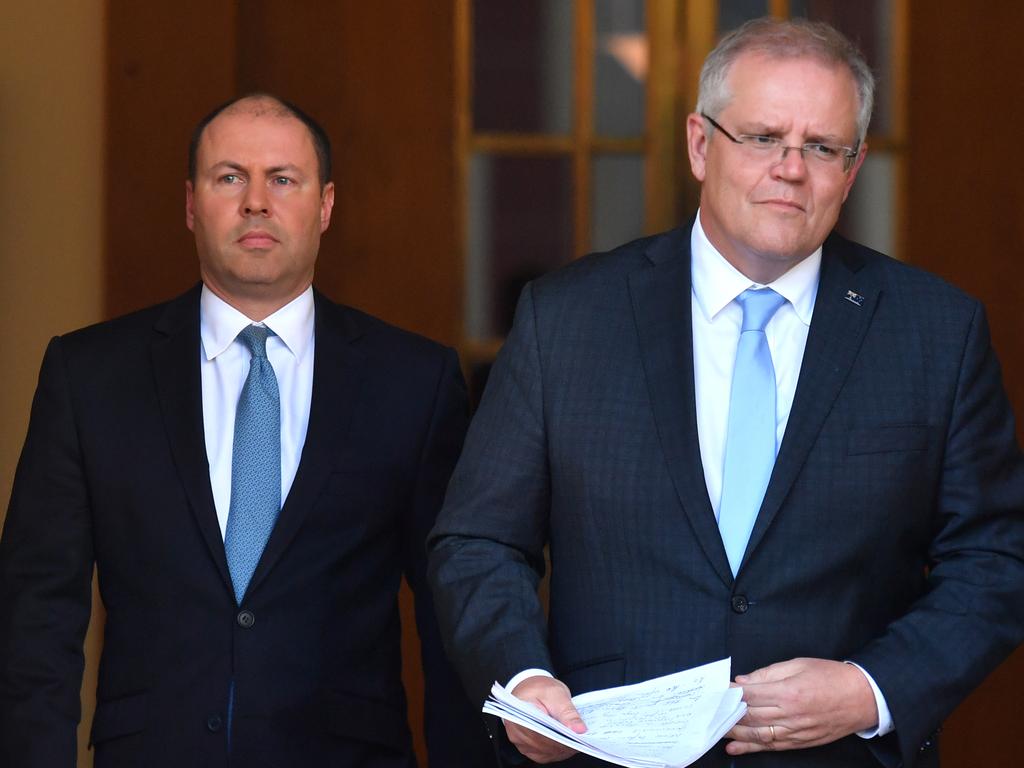
The second difference is speed. Sheer speed. No Australian government has taken so many far-reaching decisions so quickly, because the spread of the virus is much faster than the march of armies. Governments are taking emergency decisions that have generational consequences. Normally such decisions would be assessed for months or years. Now they are taken within a few days.
The strategy of Scott Morrison and Josh Frydenberg is to avert a catastrophic economic and social collapse in Australia by averting a worst-case depression while also recognising that a severe economic downturn is inevitable.
In his remarks, the Prime Minister said: “Many countries in the months ahead, and perhaps beyond, may see their economies collapse. Some may see them hollow out. In the very worst of circumstances we could see countries themselves fall into chaos. This will not be Australia. We will get Australians through this.”
The nation has not faced such pressures for several generations. The $130bn JobKeeper package is without precedent in our history in its size and design — a wage subsidy for half the workforce. It brings the total fiscal injection from the three packages to about 10 per cent of GDP. There will be more in the coming days, but nothing remotely on this scale.
One of the most experienced analysts of the economy told this column: “The situation is beyond bad. The place is on life support. What the government did was gobsmacking, but they had no option. I doubt that six months will be long enough and I cannot see unemployment not rising above 10 per cent.”
Deloitte Access Economics partner Chris Richardson said: “Last week we probably lost a million jobs, with the unemployment rate going from 5 per cent to about 12 per cent, and chances are we got half or more of that back. Judged against the speed of decision-making this is a very good package. We have learnt the lessons from the past. We know recessions are a grab-bag of horror because unemployment increases quickly and comes down only slowly.”
This crisis has destroyed ideological positions. The Morrison government now functions in a national emergency. The Liberal Party, founded on the ethic of free enterprise, is deploying state power and paying private sector wages to save free enterprise.
It is right in these actions. The golden rule in downturns is: if you make a mistake, make sure you spend too much, not too little. Richardson said: “The mistake we made in the GFC is we spent too much — but count me happy. If we spend too much this time, count me even happier.”
But this situation is different because the economy cannot recover until the virus is in retreat. The economic trade-off is how much to spend today to get a better economic outcome tomorrow.
If the health issue is not moving to a resolution at the end of six months, the Morrison government cannot allow its wage subsidy to extinguish. It will need to extend it in some form or another, again at massive cost.
Because the government is inducing the economic downturn to save lives, it has a moral obligation to cushion the impact as much as practicable. The cost will be measured in spiralling debt and deficits that will define the next generation, with the consequence of higher taxation.
Many of today’s Australians will never see a budget surplus again in their lifetime.
ALP leader Anthony Albanese says Labor will support the package in the parliament. That’s obvious. Labor has been vindicated by calling for the wage package last week, when the Coalition government initially brushed aside such demands.
Opposition Treasury spokesman Jim Chalmers told the ABC: “We support the government’s change of heart. On the indications that we have now, I think we’re headed for a generation of debt, unfortunately.”
Morrison knows such spending will provoke criticism. These decisions will define much of the evolving identity and future of the Liberal Party, the pivotal issue being their degree of success. “It is never the time for rash or ill-conceived decisions,” Morrison said. Decoded: I know the stakes involved. Morrison said the purpose was to guarantee workers and business “an economic lifeline” for six months. Of the $130bn wage subsidy, he said: “Some will say it’s too little, others will say it’s too much.” There is one certainty: in this situation, no government makes the perfect call.
The strategy of hibernation is complex. Everything depends on employers signing up. This is the mechanism that allows existing staff and stood-down staff to access the $1500-a-fortnight wage subsidy.
While Morrison’s scheme came after those of Britain and New Zealand, it is of a superior design. The costing is based on a take-up by six million private-sector workers. Business registration was skyrocketing in the first 24 hours.
The government has learnt three key messages from the crisis so far: stay flexible and don’t be afraid to change your mind; get the policy design right; and be bold.
This is Morrison’s version of Bob Hawke’s corporate governance and national consensus in action. Hawke would have been proud of this package. It seeks a workplace deal based on shared interest — to guarantee an income for workers, both stood-down and still at work, while sustaining Australian businesses until the health crisis passes.
It is a form of part payroll nationalisation until the bridge is crossed and has generated extraordinary institutional support — from Labor, the trade unions, and large and small business.
The fact a Liberal government smashed its traditional economic stances to reach this policy is fundamental. The interview on the ABC yesterday morning with Business Council of Australia chief executive Jennifer Westacott and ACTU secretary Sally McManus told the whole story.
McManus said: “We’ve pushed really hard for this, along with business as well. You’ve got to think this is a rare moment in history where you’ve got the union movement, the government and big business all agreeing. We’re going to do everything we can to keep people in jobs.”
Westacott said: “I think this is one of these country-saving moments. You know, six million people getting paid. Six million people getting a decent standard of living, being able to stay attached to their employers, together with their employers rebuilding their businesses. This is the hope and confidence we needed to get through this.”
Amid the crisis, there are encouraging omens. The institutions are shrugging off their jackets of complacency. The parliament is being responsible. The national cabinet invokes a spirit of astonishing federal-state engagement. The Reserve Bank has risen to the challenge. The banks, aware they are on trial, have pledged to support business and householders. And there’s a partnership between McManus and Industrial Relations Minister Christian Porter.
It is remarkable how far Morrison has gone to generate all-round agreement. The language he uses is “uniquely Australian solutions”, which conceals more than it reveals. But consider the package. The net is cast wide and applies to full time, part time, casuals, the self-employed and not-for-profits. It is backdated to March 1, and the payment has sufficiency — at 70 per cent of the median wage and 100 per cent of the hospitality and retail median wage.
Critically, it applies to all companies, regardless of size — although eligibility is steeper for those businesses with a turnover of more than $1bn.
Even more remarkable, it is an “equality of outcome” model — a notion most Liberals usually shun — with everybody eligible getting $1500 a fortnight, sold by Morrison as reflecting the Australian way. Economist Saul Eslake said: “The flat-rate nature of the payment avoids the argument we might otherwise have had about the equity implications of a subsidy expressed as a proportion of wages, as in the UK.”
Eslake said that without the package, unemployment would have exceeded 10 per cent and might even have reached 15 per cent. He said the package formed part of a wider suite of measures — relief from tax obligations, debt service payment holidays, income support and yet-to-be announced rent relief measures — designed to ease business costs to the maximum during their period of collapsed revenues.
There are terrible times coming. But a crisis such as this can change a nation and its psychology. The critical question — too early to answer — is how this crisis will change Australia.
The last decade of the 29-year recession-free cycle has been a time of both social and economic underperformance, indulgent polarisation, second-rate policy, third-rate debate, weak productivity, brainless celebrity obsession and a creeping culture of individual narcissism.
One fiscal package cannot change that. But in a crisis, there are signs of hope, a new determination … and a sharing of sacrifice.








The wartime analogies in the fight against COVID-19 are accurate, but with two crucial differences. First, this war is being fought on home soil, not abroad; the civilian population is the frontline, and the measures governments are implementing at home are more onerous than applied during wartime.